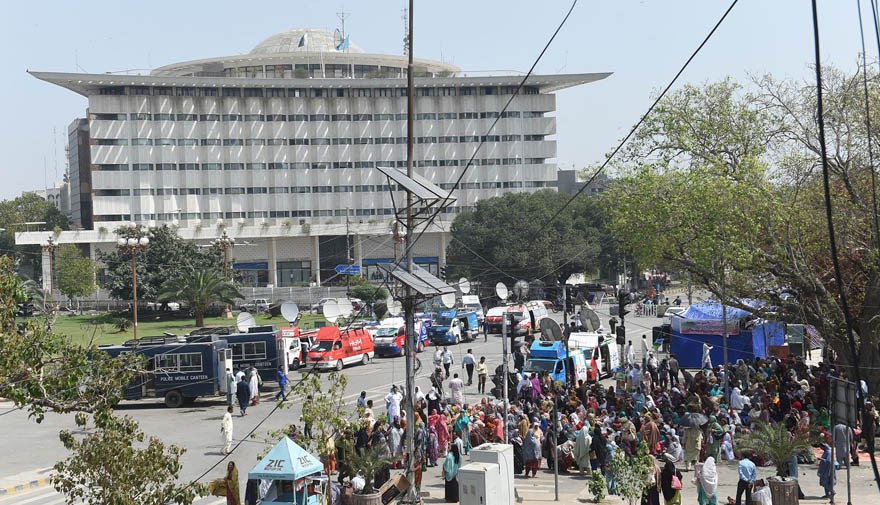
Lady Health Workers (LHWs) held a sit-in, demanding clearance of their arrears and a proper service structure for them

The historical Chairing Cross (rechristened Faisal Chowk) on The Mall, near Punjab Assembly, echoed with the sound of siren of the approaching ambulances on Thursday last. Apparently, these had been called in to attend a number of women who had fainted on the road, in the middle of a protest that they were a part of and which had entered day three.
The said protest was by Lady Health Workers (LHWs) who were demanding clearance of their arrears and announcement of a service structure for them. There were other concerns as well that they wanted to bring into the notice of the government high-ups.
Rukhsana Anwar, President, National Programme Health Employees Association Punjab (NPHEAP), tells TNS that an average of 15 LHWs fainted on a daily basis [while protesting] in the hot weather. "But the government seems unmoved."
According to her, a couple of women were in critical condition, though no one had expired as rumoured. "Most of them [LHWs] are above 40 years of age, and suffer from hypertension, diabetes, and other diseases that might have been caused by stress.
"The inhuman policies of the government of Punjab are the cause of their stress," she declares.
Anwar also says that the LHWs across the province had not been paid Rs150,000 per head, a payment that was pending from 2012 to 2014. Besides, their salaries have been delayed by four months. "We’ve dedicated our full time to this job, yet we haven’t been paid a penny. We don’t have a service structure which is unfortunate.
"Our health workers were recruited on the basis of middle class/8th grade prequalification. Now many of us have enhanced our educational qualification to graduation and masters’ level. Our salaries must be increased and our scale revised accordingly."
Rejecting the allegation levelled by Anwar, Dr Mukhtar Hussain Syed, Director of ‘Integrated Reproductive Mother Newborn Child Health Programme’ says that the LHWs were recruited and initially given a stipend of Rs1,200 per month, in 1994. Later, the government raised the amount to Rs2,100 which was further enhanced to Rs3,500."
He claims that the health workers were recruited in grade five and now they are getting Rs20,000 a month. Most of these women were of 40 years or above, but they managed to get certificates of middle class in which they mentioned their age to be 25 and got the job.
Syed also says that the LHWs demanded arrears for the period of 2012-14 and the government accepted their demands and released the amount which shall be paid to them in four installments. "The government has also accepted their demand to form a proper service structure, and forwarded the case to secretary health for approval."
He says that the actual reason why they are still up in arms is something else: "It has to do with the tabs or laptops they have been provided with for use at work. If a health worker visits a house where a lady needs consultation on mother care or health nutrition, she is supposed to feed the data so that it can be viewed by the concerned department people.
"The LHWs shun technology because it means having to work. Besides, through the gadgets, they can be located via GPS. They cannot withdraw salary without working like they used to do."
For Anwar, the Health Secretary gave the LHWs "a fake notification, so as to disperse the protestors. We shall not quit protesting, until our demands are met."
Syed highlights another issue: "A Lady Health Supervisor [LHS] oversees 20 lady health workers. If a supervisor is not satisfied with the work of a worker, the latter’s job shall be at risk. That is why the LHWs have come here to participate in the protest. They just want to save their own skin and avoid accountability done by the supervisors."
Shaheena Bibi, a health worker hailing from Bahawalpur, rejects the notion that the protest was due to the pressure by the LHSs. "We are here to fight for our rights.
"It’s not an easy ride," she says. "We don’t have a toilet at the protest site. Some of us are forced to use the facility in a nearby mosque. Besides, we sleep on the roads during the night, and sit under the hot sun all day long. Does the government care? What humiliation!"
Dr Mukhtar Hussain Syed says that the government wants to resolve the issue through negotiation, and Rana Sanaullah and the health secretary are going to engage with the protestors.
"Actually, the project was meant to provide stipends to women who visit 10 houses a day and give information regarding pregnancy. Post delivery, the LHWs’ job is to raise awareness about the health of mother and child. We recruited one health worker on stipend from 200 houses of 1000 people. Now these LHWs have turned against us."
Meanwhile, at the time of filing of this report, leaders of different political parties including Jamaat-e-Islami’s Amir Senator Sirajul Haq, leader of the opposition in Punjab Assembly Mian Mehmoodur Rashid, and members of the left and progressive groups had joined forces with the protestors.